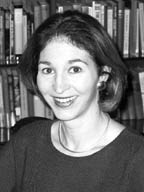
Focus
on the Woodrow Wilson School
 Anne-Marie
Slaughter ’80 (pictured), who became Dean of the Woodrow Wilson School
earlier this fall, is already bringing dynamic new leadership to the School.
I asked her to contribute this page.—S.M.T.
Anne-Marie
Slaughter ’80 (pictured), who became Dean of the Woodrow Wilson School
earlier this fall, is already bringing dynamic new leadership to the School.
I asked her to contribute this page.—S.M.T.
It has been a fascinating three
months at the Woodrow Wilson School. We are the only school of public
and international affairs in the world that can boast a Nobel Laureate
on its faculty. Daniel Kahneman’s achievement highlights some of
the most distinctive features of the School. As a psychologist, his work
on how human beings value the things they have over the things they could
have, and how they make decisions under uncertainty, has underpinned the
creation of an entirely new field of economics, behavioral economics,
in which economists draw on cognitive psychology and work with psychologists
to revise their traditional paradigm of the completely rational homo economicus.
Here is cutting-edge research
in one discipline with revolutionary implications for multiple others,
ultimately changing the basic assumptions that we rely on to address critical
public problems. All of our Masters in Public Affairs (MPA) students must
take a basic course in “psychology for policy analysis and implementation.”
Integrating these insights with the economic, statistical and political
techniques that they learn to apply in diagnosing problems and proposing
solutions is a critical part of the toolkit they bring to the world of
public and international affairs when they graduate.
The School brings together
an extraordinary faculty from multiple disciplines—politics, economics,
psychology, sociology, physics, molecular biology, geosciences and law—to
train students at both the undergraduate and graduate levels and to generate
knowledge with a direct or indirect application to domestic and international
policy problems.
Of particular interest is the
teaching and research that we do in the international area. In recent
years, many of our leading faculty in international politics have retired
or moved to higher academic office, so we are in the process of rebuilding.
Among our current faculty, Aaron Friedberg, Director of the Center for
International Studies, has just published an edited volume that is proving
highly influential in national security strategy. Entitled Strategic Asia
2001-2002: Power and Purpose, it compares strategy and power across Asia.
Michael Doyle is finishing a two-year public service leave as Assistant
Secretary General of the United Nations, where he has been advising Kofi
Annan on issues such as the Global Compact, a UN initiative with corporations
around the world to improve labor, environmental and human rights standards.
Among assistant professors, Gary Bass has published the only systematic
look at war crimes trials over time and around the world. His book, Stay
the Hand of Vengeance: The Politics of War Crimes Tribunals, is a fascinating
read.
On the economic front, chair
of the economics department and WWS faculty member Gene Grossman has just
won a best book award from the American Political Science Association
for his work with Elhanan Helpman on the special interests in domestic
politics that shape trade policy. Anne Case, a graduate alumna of the
School, is pioneering studies of poverty, inequality and health in South
Africa. She currently oversees, with Angus Deaton, a large-scale survey
collecting data on a range of traditional and non-traditional measures
of well-being, including income and consumption, measures of health status
(including mental health), morbidity, crime, social connectedness and
intra-household relationships.
Case’s work highlights
an important trend and challenges us to rethink our definition of “international
affairs.” Consider, for instance, the intersection between public
health and national security. The AIDS epidemic has altered security relationships
in Africa in ways that can impede the pursuit of terrorists. Conversely,
issues formerly only viewed as security concerns, such as civil wars,
are now being looked at as public health threats. The disintegration of
governments and societies is a breeding ground for migrants and pathogens
alike.
Problems of domestic public
health are also being reanalyzed through comparative case studies. For
example, Professor of Sociology and Public Affairs Sara McLanahan, most
noted for her research on “fragile families” within the United
States, also studies the nature of the family across national boundaries.
In a recent book she draws lessons for the United States about single
mother families and social politics from the experiences of Canada, France
and Sweden. Experts in demography and public health, such as Burt Singer,
Noreen Goldman and Betsy Armstrong, study issues ranging from disease
control to contraception to the impact of stress and trauma on biological
and psychological well-being in comparative context.
A second example of the growing
connectedness of international and domestic issues, both in practice and
scholarship, is in the area of economic regulation. Professor Robert Willig,
the former Assistant Deputy Attorney General for Economics in the Department
of Justice, writes widely on the international political effects of domestic
regulation in areas such as antitrust and telecommunications, as well
as on comparative experiences with privatization in developing countries.
In science, technology and the environment, issues such as air pollution,
climate change and wildlife conservation—the respective specialities
of Assistant Professor Denise Mauzerall and Professors Michael Oppenheimer
and David Wilcove—are inherently global.
In sum, it is fitting that
a school of public and international affairs should take account of the
blurring of the boundary between the two, to the point of dissolution.
Our efforts to construct a more secure, stable and just world depend on
research and teaching in health, extraterritorial economic regulation
and the environment as much as on more traditional studies in international
security and political economy. Our “domestic” faculty and our
“international” faculty are crossing these boundaries in ways
that are likely to redefine both the academy and the world we study. ![]()
